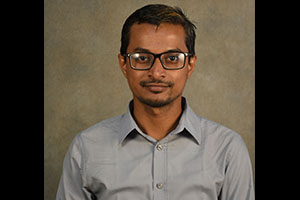Published date: 10/03/2018
Editor’s note: This is an archived article/report. The content, links, and information may have changed since the publication date.

Growing up in Bangladesh, Hossain Mohiuddin could see the rising traffic congestion and complex mixture of different transportation modes, the suffering of working people struggling to commute back and forth from work, unplanned housing, and a lack of urban facilities. This led him to study urban and regional planning at Bangladesh University of Engineering and Technology (BUET) where he began to observe and investigate the complex urban problems from an academic perspective. After taking courses in traffic engineering and transportation planning, he began to think about the transportation problems of his home city, Dhaka, and became more fascinated with the topic of transportation planning.
Hossain came to the University of Iowa to study urban and regional planning in the fall of 2017 aiming to focus on transportation planning. He was fortunate to be awarded a Graduate College Summer Fellowship in 2018. For his fellowship, he worked with the Iowa City, city manager’s office to conduct research on how the city will adapt to automated vehicles.
For the project, he initially met with researchers at the National Advanced Driving Simulator (NADS), a transportation safety research center in the University of Iowa’s College of Engineering. NADS is the largest public driving simulator in the world. Their research focuses on the areas of human factors, vehicle safety systems, driver impairment, driver distraction, connected vehicle technologies, automated vehicles, and simulation and on-road data collection technologies. NADS is currently using the Iowa City-Cedar Rapids corridor as a test site and proving grounds for automated vehicles. They are studying the research from every state’s automated vehicle advisory board.
Hossain’s fellowship was then narrowed down to study how automated vehicles would affect Iowa City parking and street design, what legislation would need to be implemented, land use, effects on city budgets, and the integration of automated vehicles into the public transit system. His work included collaborating with the City Manager, Geoff Fruin; Assistant City Manager, Ashley Monroe; Assistant to the City Manager, Simon Andrew; and the city’s Director of Transportation Services, Darian Nagle-Gamm (URP alum).
There are approximately 60 other cities around the world currently piloting or preparing projects on automated vehicles. Bloomberg Philanthropies has assembled datasets of driverless vehicles from these cities. Hossain utilized this information as he researched how city streets would need to be changed to accommodate the vehicles, finding that roads would require an additional lane to accommodate user pick up and drop off. The city plan would likely be phased in, first on city streets and then on roads in the Iowa City-Cedar Rapids corridor.
Hossain’s work created a significant foundation for a capstone project starting in fall 2018. Four students have been assigned to the Field Problems team which will focus on how Iowa City will handle the increasing availability of ride hailing services and automated vehicles, as well as associated changes in mobility services and urban space. Specifically, the project will examine allocation of urban space and public transport in Iowa City as mobility technologies evolve, and the equity implications of those changes.
Hossain says, “Working with the city administration and Iowa City Transit has given me the opportunity to apply my academic knowledge and analytical abilities to real-life situations. I’ve gained knowledge in how a transit authority runs, thus, broadening my thinking process regarding strategies of making public transit more popular. Furthermore, it has given me a better understanding of what policies may work and what may not work in real life situations.
"Additionally, working under the city manager, attending city council meetings, and having active discussions with my fellowship supervisor about different management and budgetary processes have given me a clear understanding of how cities functions, how public involvement occurs, and how local politics play a role in the City’s decisions.”
The fellowship experience was valuable for both Hossain’s personal and professional development, “It provided me with the opportunity to adapt to an organizational work environment which is entirely different from academic life. This experience will be beneficial for my future professional life.”